|
|
|
IISD's
Summary Report is available online in HTML  TEXT
TEXT  PDF
PDF
|
|
|
Highlights
for Thursday, 6 December 2001
|
|
 On
Thursday, the Conference met in concurrent open-ended sessions throughout
the day, continuing with panel presentations and discussions. In the
morning, panels on the marine environment and small island developing
states were presented simultaneously with a panel on capacity building. In
the afternoon, participants chose between panels on regional seas and
emerging issues. On
Thursday, the Conference met in concurrent open-ended sessions throughout
the day, continuing with panel presentations and discussions. In the
morning, panels on the marine environment and small island developing
states were presented simultaneously with a panel on capacity building. In
the afternoon, participants chose between panels on regional seas and
emerging issues.
In
the morning, Sian Pullen, WWF, reviewed Wednesday's proceedings and
highlighted, inter alia, the need for: participatory approaches to ICM
implementation; better coordination among agreements; and integration of
MPAs as critical components of ICM programmes.
|
|
|
|
PANEL 12: STATUS OF AND
PROSPECTS FOR THE MARINE ENVIRONMENT
|
|
|
|
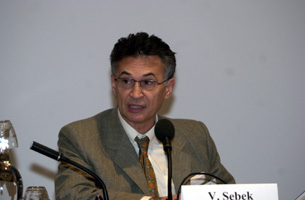
Chair Victor Sabek, Advisory Committee on Protection of the Sea
introduced the panel.
|
|
|
|
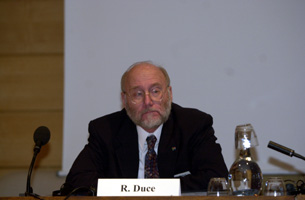
Robert Duce, Texas A & M University, USA, presented the Group of
Experts on the Scientific Aspects of Marine Environmental Protection
report on Protecting the Ocean from Land-based Activities. He highlighted
destruction and alteration of habitats, destructive fishing, sewage and
eutrophication as major global threats, and overviewed emergent problems
and means of improving global marine environment assessments
|
|
|
|
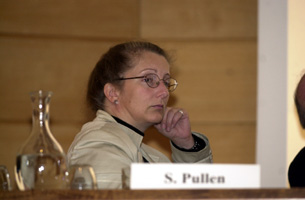
Sian Pullen, Marine Conservation Program, World Wildlife Fund,
presented five steps to an ecosystem approach for managing demands on
marine environments: development of a common vision for achievements;
assessment of resources; establishment of decision-making mechanisms;
identification of delivery tools; and development of a strategy for
delivery, and called for development of such a vision at the WSSD.
|
|
|
|
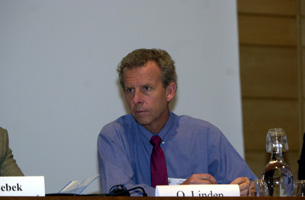
Olof Linden, University of Kalmar, Sweden, presented the Global
International Waters Assessment (GIWA), a UNEP-led program that assesses
the state of the oceans and methodically identifies priority issues from a
combined environmental and socio-economic perspective.
|
|
|
|
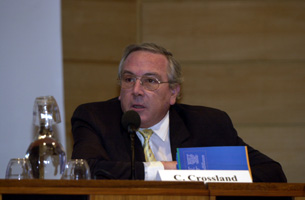
Chris Crossland, LOICZ, Netherlands Institute for Sea Research,
outlined pressures on coastal zones, bringing together data on natural and
climatic change, anthropogenic environmental effects and population
pressures.
|
|
|
|
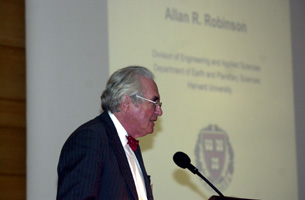
Allan Robinson, Dept of Earth and Planetary Sciences, Harvard
University, USA, addressed scientific complexity in coastal ocean systems.
He said coastal ocean science examines interdisciplinary processes that
work on multiple, interactive scales of space and time with bi-directional
feedbacks, and highlighted the sensitivity of these processes to isolated
events.
|
|
|
|
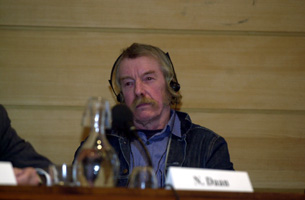
Niels Daan, Netherlands Institute for Fisheries Research, discussed
the Convention for the Protection of the Marine Environment of the
North-East Atlantic (OSPAR Convention) framework for qualitative and
quantitative assessment of North Sea marine populations, focusing on the
development by scientists of indicators, objectives and methods for
implementation.
|
|
|
|
PANEL 13: ISSUES IN SMALL
ISLAND DEVELOPING STATES
|
|
|
|
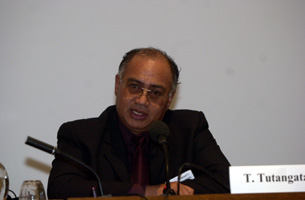
Chair Tamari'i Tutangata, South Pacific Regional Environment
Programme, introduced the panel.
|
|
|
|
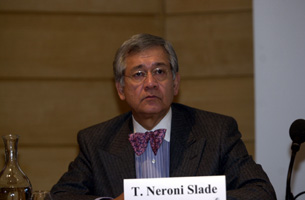
Tuiloma Neroni Slade, Alliance of Small Island Developing States (AOSIS),
gave an overview of regional cooperation among SIDS since Rio, noting that
progress has probably been made since Agenda 21 but the list of tasks that
remain is still "formidable."
|
|
|
|
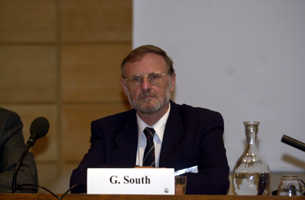 Robin
South, International Ocean Institute, University of the South Pacific,
Fiji, spoke on issues that continue to threaten marine environments in the
Pacific islands region, including biodiversity loss and threats to water
resources, and noted growing threat from the rapid transition from a
subsistence to cash economy. Robin
South, International Ocean Institute, University of the South Pacific,
Fiji, spoke on issues that continue to threaten marine environments in the
Pacific islands region, including biodiversity loss and threats to water
resources, and noted growing threat from the rapid transition from a
subsistence to cash economy.
|
|
|
|
Nelson
Andrade, Caribbean Environment Programme (CEP), UNEP, outlined
accomplishments and constraints in the Caribbean region since Rio,
highlighting adoption of the CEP Action Plan and ICM activities
coordinated at the national and regional levels.
|
|
|
|
Dirk
Troost, Environment and Development in Coastal Regions and in Small
Islands (CSI), UNESCO, and Gillian Cambers, CSI, UNESCO, presented their
paper on inter-regional initiatives for sustainable small-island
development. Troost addressed the benefits of inter-regional networking,
and Cambers presented the results of a workshop on ethical practice for
donors and investors, which included findings that recipient countries
should prepare and regularly update funding priorities, and be free to
choose projects for participation
|
|
|
|
PANEL 14: BUILDING
CAPACITY FOR IMPROVED OCEAN AND COASTAL MANAGEMENT
|
|
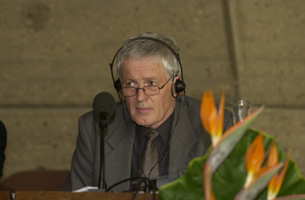 This
panel featured representatives from the scientific, academic and political
arenas, and divided discussions into three segments: building scientific
and technological capacity for OCM; application of the social sciences to
ICM programmes; and emerging directions in capacity building. Conference
Co-Chair Bernal introduced speakers and guided the discussions in the
first two segments, and Angus McEwan (right) Chaired the third. This
panel featured representatives from the scientific, academic and political
arenas, and divided discussions into three segments: building scientific
and technological capacity for OCM; application of the social sciences to
ICM programmes; and emerging directions in capacity building. Conference
Co-Chair Bernal introduced speakers and guided the discussions in the
first two segments, and Angus McEwan (right) Chaired the third.
|
|
|
|
|
|
PANEL 15: REGIONAL SCALE
OF OCEAN GOVERNANCE
|
|
|
|
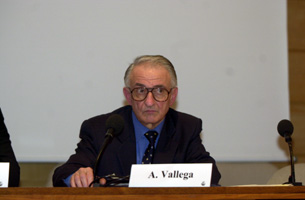
Chair Adalberto Vallega, International Geographic Union, introduced the
panel members for this session.
|
|
|
|
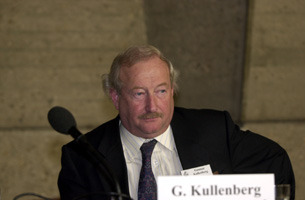 Gunnan
Kullenberg, International Ocean Institute (IOI), presented IOI's Virtual
University, which aims to extend knowledge and information on oceans and
coasts to a distributed audience of policy makers, coastal managers, and
others who can benefit from masters-level coursework in marine affairs and
governance. Gunnan
Kullenberg, International Ocean Institute (IOI), presented IOI's Virtual
University, which aims to extend knowledge and information on oceans and
coasts to a distributed audience of policy makers, coastal managers, and
others who can benefit from masters-level coursework in marine affairs and
governance.
|
|
|
|
Vallega
presented a paper on ocean regionalization, describing the history of the
movement and legal framwork as established by UNCLOS and affected by
UNCED's focus on the ecosystem-based approach to resource management.
|
|
|
|
A paper by Jorge Illueca,
Division of Environmental Conventions, UNEP was presented by Tamari'i
Tutangata, addressing regional seas conventions and action plans. The
paper describes considerations in the future of the regional seas
conventions, including the importance of marine pollution control and ICM.
|
|
|
|
Ken Sherman, National Marine
Fisheries Service, USA and GEF, spoke on symptoms and causes of breakdown
in coastal and marine ecosystems, and described collaboration with the GEF
for management of large marine ecosystems.
|
|
|
|
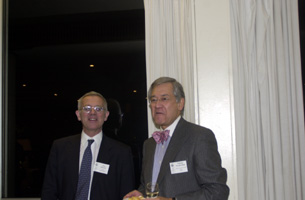
Alan Simcock, OSPAR Convention, addressed regional cooperation
enhancement taking the OSPAR Convention as a case study, and particularly
noting the emergence of long-term strategies and broadening of the
Convention to cover all human activities.
|
|
|
|
Peter
Stenlund, Arctic Council Secretariat, spoke on the Arctic Council, a
unique intergovernmental forum that incorporates governments and
indigenous peoples' groups on an equal footing.
|
|
|
|
Tamari'i
Tutangata, South Pacific Regional Environment Programme (SPREP), described
the Council of Regional Organizations of the Pacific, outlining key
aspects of the regional approach including advantages stemming from
economies of scale in centralized training services.
|
|
|
|
Miguel
Fortes, Marine Science Institute, University of the Philippines,
Philippines, presented information on seagrass and mangrove ecosystems and
the benefits they provide.
|
|
|
|
Andre-Serge Mikouiza
presented a paper on problems of protecting Caspian Sea biodiversity,
which focused on specifics of zooplankton and mnemiopsis population change
as an indicator of more general biodiversity loss in the region.
|
|
|
|
PANEL 16: EMERGING ISSUES
IN OCEAN AND COASTAL MANAGEMENT
|
|
|
|
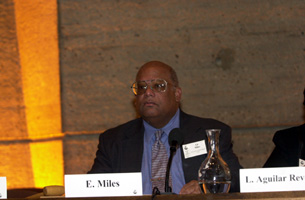
Chair Ed Miles, University of Washington, introduced the panel and
made scheduling announcements.
|
|
|
|
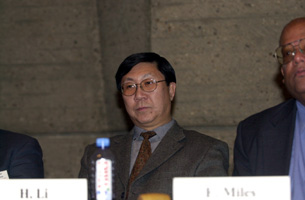
Haiquing Li, State Oceanic Department, China, gave his personal
perspective on the growing issue of coastal mega-cities, noting that to
the problems of crowding, pollution and waste disposal associated with any
large metropolis they add problems of freshwater supply, coastal erosion
and conflict for coastal resources.
|
|
|
|
Loreno Aguilar Revelo, IUCN,
presented statistics on population, gender and coastal demographics, and
said gender issues were not an emerging problem so much as a reality. She
underlined the need to, inter alia, include women in
decision-making, supply gender-sensitive family planning and consider the
needs of all residents in coastal planning.
|
|
|
|
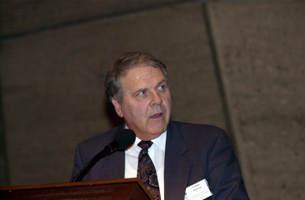 Art
Hanson, Ocean Ambassador, Canada, outlined: the close relationship between
trade and sustainable development concerns; recognition of sustainable
development within WTO processes; and future directions of the
trade/development agenda, including the harmonization of trade, investment
and MEAs, and employment of the precautionary principle in trade
agreements. Art
Hanson, Ocean Ambassador, Canada, outlined: the close relationship between
trade and sustainable development concerns; recognition of sustainable
development within WTO processes; and future directions of the
trade/development agenda, including the harmonization of trade, investment
and MEAs, and employment of the precautionary principle in trade
agreements.
|
|
|
|
PHOTOS FROM THE RECEPTION
HOSTED BY THE GOVERNMENT OF CANADA
|
|
|
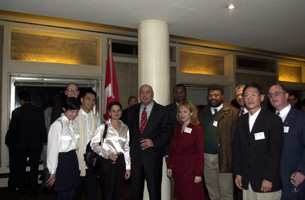
|
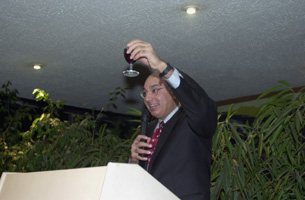
|
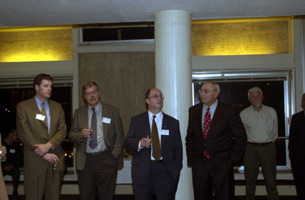
|
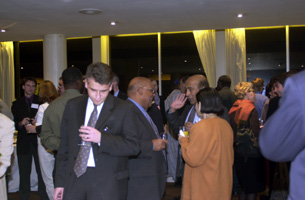
|
|
|
|
|
|
|



